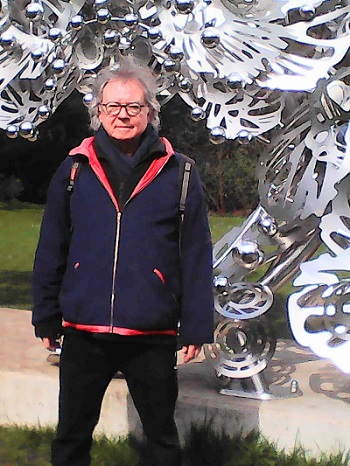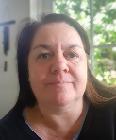 SENSE member Michael Dallas (on the left, photographed by Sheila Gogol at Beatrixpark in Amsterdam-Zuid in 2021) has been actively contributing to the Society since he joined many years ago. His numerous and informed editing and translation suggestions posted to the Forum on our website have helped many SENSE members. But his contribution goes beyond that, as he is the compiler of a supplement to the Van Dale Dutch-English dictionary, colloquially known as the ‘Van Dallas’, available in our Library. In the following interview, Michael shares with us a bit of his history and how he began compiling his extraordinary supplement.
SENSE member Michael Dallas (on the left, photographed by Sheila Gogol at Beatrixpark in Amsterdam-Zuid in 2021) has been actively contributing to the Society since he joined many years ago. His numerous and informed editing and translation suggestions posted to the Forum on our website have helped many SENSE members. But his contribution goes beyond that, as he is the compiler of a supplement to the Van Dale Dutch-English dictionary, colloquially known as the ‘Van Dallas’, available in our Library. In the following interview, Michael shares with us a bit of his history and how he began compiling his extraordinary supplement.
Can you tell us about your professional background?
I joined SENSE in 1995, shortly after I started translating and editing professionally in the social sciences and social work. I soon also developed a specialization in mental health, mainly epidemiology. All those fields had plenty of jargon that I needed to keep track of. I had previously held clerical jobs in the Universiteit van Amsterdam’s Faculty of Social Sciences, where I had gained some experience on the side working with researchers on their English publications.
I understand that you once had dual American-Dutch citizenship. What brought you to the Netherlands and what made you stay?
I decided to emigrate from the US while doing my ‘junior year abroad’ in England. I would have chosen England, Germany or Denmark as my destination, but I later made four Dutch friends in New York who persuaded me to move to Amsterdam. They met my boat at the Amsterdam Passenger Terminal and helped me learn Dutch and find housing, work and friends. From the very beginning, I planned to settle in Amsterdam for good. That was almost 50 years ago. I identify as Dutch or European, not as American. I gave up my US citizenship about ten years ago, after the Dutch banks started imposing restrictions on US citizens.
Your supplement to the Van Dale Dutch-English dictionary has more than 700 pages of original and useful Dutch terminology translated to English. Can you tell us about the genesis of this impressive list? Have you thought of publishing it?
The idea originated about 20 years ago when SENSE member Joy Burrough announced on the Forum that some of her reference books had been destroyed by a fire in her office. I pulled out my Van Dale NE (which was already falling apart) and realized how vulnerable it was. I had jotted notes down the margins of almost every page.
Although digital terminology systems already existed then, I preferred a hands-on approach. I decided to transfer all my margin notes into a Word document that could be stored externally. I had just acquired a voice recognition program, so I first dictated lists of Van Dale entries section by section, then switched to English, repeatedly said ‘move down three’, and then dictated the English translations under the Dutch words. I was surprised how smoothly that went. The original version looked much like the current one, but it had only 400 pages. I was mainly concerned with specialized jargon, but also with difficult-to-translate expressions like aansluiten op/bij.
Theoretically I could have tried to further manicure and publish the list, but that seemed like too much work and stress, so I began sharing it with colleagues. I’ve developed the habit of plucking new entries from various sources, often the SENSE Forum. Working for academics, I don’t have many rush jobs, so I have time to contemplate and note down possible translations. Many of the English terms listed are a result of ‘thinking out loud’ while translating.
You are an editor and a translator from Dutch to English who also has a Bachelor of Arts in German. Are you appreciative of multilingualism? Why?
When I obtained my BA in German in New York, I was mainly just interested in moving to Germany. In Amsterdam I earned a Bachelor's in sociology, and that was more serious. But remembering my unfulfilled ambition to live in Germany, I rented a pied-à-terre in Berlin 17 years ago, where I stay about half the time. I belong to a translators’ forum and Stammtisch. I wondered at first whether I could work in German, but in practice I’ve kept working for Dutch clients only. I no longer think I’ll ultimately settle in Berlin.
I realized the value of multilingualism when I took Latin (my first foreign language) in high school in the US. I’ve found that learning the grammar, structure and vocabulary of another language gives you tremendous insights into your native language. Since then I’ve dabbled in Spanish, French, Danish and Czech, but Dutch and German are the only foreign languages I speak fluently.
What have you found in SENSE that has made you stay a member for so long?
I’ve only held one office in SENSE, that of Membership Secretary 25 years ago, but I’ve long contributed my insights about vocabulary and rules of publication style to the Forum. In return I’ve learnt a lot from the many accomplished language professionals in SENSE, both via the Forum and at workshops and meetings. Volunteering gives me a sense of fulfilment if I believe I’m helping other people, but it also makes me more aware of what I know and do.
What do you like to do in your free time?
Nowadays I spend a good deal of my free time reading informative articles on the internet and catching up on books I’ve had on the shelves for years (e.g. I’m now reading up on Habermas). I read mostly non-fiction texts on history, society and politics. I also walk or cycle every day and travel occasionally in Europe, either alone or with friends.
|
Blog post by: Paula Arellano Geoffroy Website: paulaarellanogeoffroy.com LinkedIn: paula-arellano-geoffroy |

